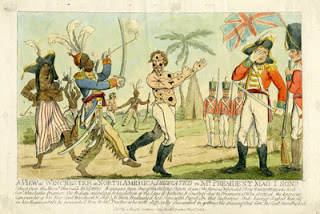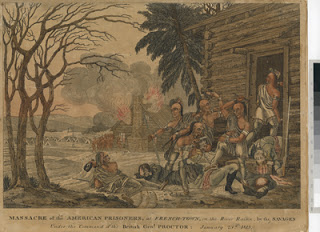January 18 and 22 mark the bicentennial of a pair of battles of the War of 1812 that deeply affected the American population of Ohio, Kentucky, and the Michigan Territory. The battles were fought in Frenchtown or River Raisin (today Monroe, Michigan), and they were a costly blunder and setback for United States forces attempting to regain Detroit and drive British forces from the region.
The fall of Detroit on August 16, 1812, included the loss of Brigadier General William Hull’s entire Northwestern Army. Michigan Territory was lost, and the northern frontiers of Ohio and Indiana Territory were exposed to attack by the British and their Native American allies. New US forces were rapidly raised in the fall of 1812, and the situation was soon stabilized. Brigadier General William Henry Harrison established a post at the rapids of the Maumee River as a base for advancing against Detroit when the time was right. The place was later named Fort Meigs (Perrysburg, Ohio).
In January, during Harrison’s absence, Brigadier General James Winchester received word that a force of Canadian militia and Native Americans had occupied Frenchtown. Winchester sent a force of 650 Kentucky militia to attack them. This was successfully accomplished on January 18, 1813. Learning of this minor victory, Winchester led some 300 US regulars to reinforce them. The Americans established a lightly fortified position in case the British and Indians counterattacked.
The attack came on January 22, when British regulars, Canadian militia, and Native American warriors approached the US position. Fighting raged for six hours with the regular soldiers suffering heavy casualties—at least 400 of the total US force were killed or missing. With their position deteriorating and fearing that his men would be cut off and at the mercy of the Indians, Winchester surrendered to British Colonel Henry Procter. Nearly the entire American force had been killed or captured. Procter, fearing the approach of Harrison with additional US troops, withdrew to his base at Amherstburg taking his prisoners but leaving a number of wounded at Frenchtown without protection.
Next day, the American wounded and their attendants were attacked by Native American warriors who had remained behind. About twenty were killed. The incident inflamed American popular opinion and provided an effective propaganda tool against the British. “Remember the Raisin” became a battle cry heard at several western battles during the remainder of the war.
The Clements Library holds a pair of hand-colored prints relating to the Battle of the River Raisin; one is rather comic and the other tragic. The first lampoons General Winchester being paraded before Colonel Procter by his Native American captors. The other depicts the gruesome details of the attack on the wounded. Its provenance and purpose are unknown, and the Clements has the only known copy. Details in the print strongly imply British responsibility for the incident: the British royal cypher “GR” on the blade of a scalping knife and an empty British camp where there should have been guards. They are both a part of the Clements’s rich collections documenting the War of 1812.
Visit the Clements’s online exhibit about the War of 1812 at: The War of 1812: A Bicentennial Exhibition.


